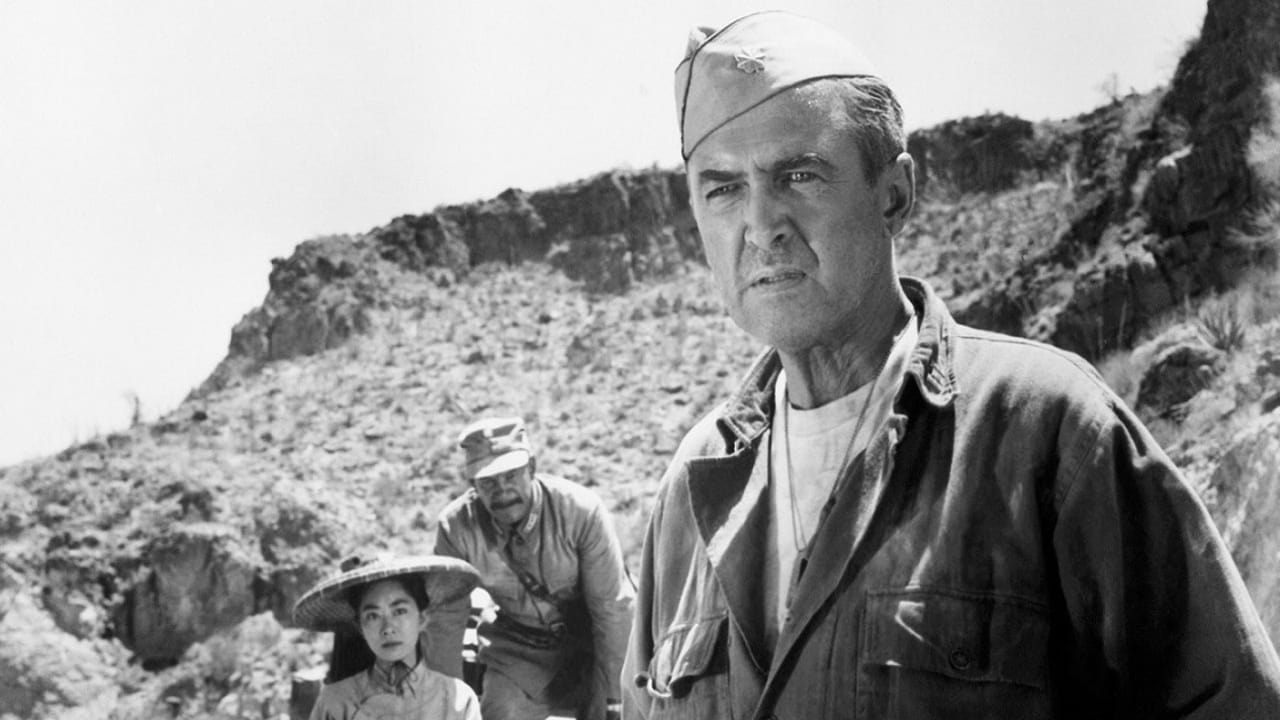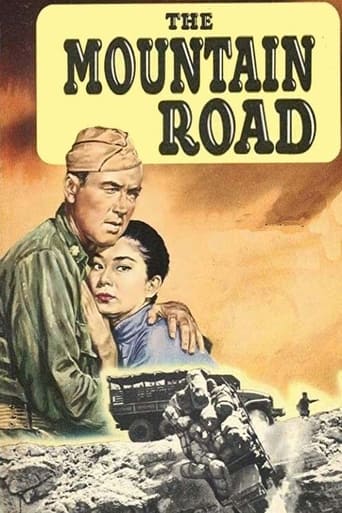



Waste of Money.
Excellent, a Must See
This is one of the few movies I've ever seen where the whole audience broke into spontaneous, loud applause a third of the way in.
View MoreWorth seeing just to witness how winsome it is.
This is a rare film that criticizes the KMT in China's war with Japan in 1944. The KMT was fighting the CCP (Communists) at the same time they were fighting the Japanese. The CCP was fighting the Japanese as well. They are not even mentioned in the film. The Chinese Civil War started way before 1944. It was the KMT (Chiang Kai-Shek) against the CCP (Mao Zedong). It lasted until 1949, when the CCP finally won when the KMT retreated to Taiwan. The film itself, though, has some problems. There is really not too much suspense or tension in the film. Stewart is really miscast (he was more comfortable in Air Force films) as a demolition man. Harry Morgan is very good though, as is the rest of the cast, who rescue the film from Stewart. Other than Flying Tigers, I cannot remember one other well-made film about the Chinese in WW 2. Empire of the Sun was very good, but it was not really about China. The Last Emperor was very good, but it was more about Puyi than the Chinese in WW2. At least this film marks a shift away from the stereotypical portrayal of the Chinese we had seen in films prior to 1960. There were still a few stereotypes, but not as many as before. Interesting film.
View MoreLegendary American reporter Theodore H. White covered China in the 1940s, and he wrote the novel on which this unusual James Stewart feature is based. It's not quite anti-war, but it's a very long way from the flag-waving military movies that Stewart made in the 1950s.Stewart's character is a U.S. military engineer working with a small team trying to slow a Japanese advance in China. Though there's plenty of action (especially explosions), the emphasis is on the Americans' interaction with their Chinese allies -- which is fraught with problems. Stewart's character has a local love interest, played by Lisa Lu, but their relationship is nothing like a conventional GI romance."The Mountain Road" was obviously meant to be a thought-provoking look back at World War II, and to audiences in the early 1960s it probably was. The climax may have been almost shocking. In today's more jaded world, the movie is likely to strike many viewers as dull, with an ending that resolves very little. But it you still have a rose-colored view of the "Greatest War," and think it was less morally messy than our current conflicts, this could be enlightening.
View MoreThis film can really be subtitled, "Why did We Bother to Get Involved?". It is the kind of World War II film that Hollywood would never have shot in the 1940s. For the purpose of wartime propaganda is to attack one enemy at a time. In 1941 - 1945 the Japanese were the enemy, and our allies were the brave Chinese people. Only a handful of specialists on China knew the complexity of relationships in Chinese politics. One was Lieutenant General Joseph ("Vinigar Joe") Stillwell, who had been in China since the 1930s. He knew the main enemy was Japan, but he had little trust for the Kuomintang government of General Chang Kai Shek, which he knew was corrupt. China since the teens had been suffering from a large number of civil wars between generals with armies called "War-Lords". When Sun Yat Sen founded the Kuomingtang he hoped to get the assistance of the west to build up it's arms and defeat the war-lords. Unfortunately the Japanese prevented this kind of period of consolidation to occur, so Chang found he was supporting the representatives of a constitutional government, and was opposed by the Japanese and the War-Lords. Then a third foe arose: the Communists under Mao Tse Tung. In such a complex quilt pattern like country, we could not know who were our friends or foes. Washington, D.C. decided our ally was Chang, and Stillwell was frustrated on the support we wasted on him and his cohorts.THE MOUNTAIN ROAD is a simple film about a set of Americans, led by Jimmy Stewart, who are ordered to slow down a Japanese advance into Western China by the Japanese. The interesting thing of the movie is that we never seen any Japanese soldiers. No we see only Americans and Chinese. We see how they mingle and interrelate, but also how they may end up fighting. Americans being hurt by one of the brave allied people we try to help - how familiar that sounds nowadays.Stewart initially tries to get permission from the local Kuomintgang Colonel to blow up a bridge. He does get it, although he finds the customs of the Colonel too showy (he has to eat some lunch with the Colonel). He is given the use of a Colonel Kwan (Henry Silva) as a translator, and he has to escort a well educated woman, a General's widow (Lisa Lu) to the town that is their destination. Stewart has always wanted to have a command, so he had agreed to this one. He has Harry Morgan as his chief sergeant, James Best and Mike Kellin as two of his troops, and Glenn Corbett as Collins, his right hand man and translator.The film really follows how the Americans deal with their erstwhile allies, and the results are somewhat discouraging. As time passes Steward's patience with the Chinese begins to crack. In particular two tragedies destroy it: the death of Collins while trying to do an act of kindness to the starving villagers they are among; and the roadside murder and robbery of two of the men (one a sick man) by Chinese soldiers turned into bandits. Stewart and Lu had slowly developed a love affair but the two tragedies, and Stewart's reaction to the second destroy what chances the bi-racial love affair might have had. In the end they part, and Stewart realizes he was to blame for it.Or was he? Lu makes several realistic assessments of what her China requires to survive, and it is right that unity is needed. But she is unwilling to admit that her people do not have the right to kill people for personal gain. She keeps hiding behind the fact that they don't know better. Yet the scene when Stewart catches the thief and murderers drinking in a bar in a town, they realize what he is there about and start arming themselves for the upcoming fight. Stewart tries to explain his seeking punishment of the guilty was do to the headiness of having the power of life and death in the form of his getting an active command on the field. That may be true, but the two incidents involving his men and the locals hardly paint them as innocents types protecting themselves against wicked Americans. In the end the two points of view just cannot meet at a particular point. So the romance cannot last. But the audience wonders if friendship between the two countries is worth it in the end.
View MoreThe only film that World War II veteran James Stewart made during his career was one far away from his wartime experience flying missions over Germany in the European Theater. In fact it's the Chinese mainland theater which few have ever written about.One of those who did was Theodore H. White who in the year before his first Making of the President books came out wrote the novel on which The Mountain Road is based. White was a correspondent during World War II and he covered this forgotten theater of the war where more time was spent in the quarrels with American commander Joseph Stilwell and Generalissimo Chiang Kai-Shek of the Kuomintang Nationalist Chinese forces than in actually fighting the Japanese.The year is 1944 and the Japanese army is once again on the offensive and the Chinese are retreating deeper into their interior. Stewart heads an eight man army demolition team and he's destroying a whole lot of things useful to the advancing Japanese, scorching the Chinese earth for the invaders.But he's in a country that the only things Americans know about it come from missionary tales, Pearl Buck novels, and Charlie Chan movies. Which would make Stewart's character no different than most of the rest of his countrymen. One of the people in his team is the Chinese speaking Glenn Corbett who's studied the language and culture.In this war movie, we never see the Japanese. Stewart's big problems come from the mass of refugees heading west to escape the advancing Japanese. He's also dealing with conflicting orders, with Chinese commanders looking to evade responsibility, and some outright bandits who really don't care who wins the war.Four of the team are killed and the reprisals Stewart takes cost him the affection of Lisa Lu, widow of a Chinese general who chose wrong politically and paid for it. Actually the performance I liked best in the movie is that of Frank Silvera as a Chinese Kuomintang commander who actually does understand and sympathize with Stewart, but who also knows his people.My guess is that James Stewart took this film because it's not a typical war film with no great combat scenes. It's about the responsibility of command in a war where you can't tell whom you should fear.Still The Mountain Road drags in spots and comes to no real satisfactory conclusion. It's different, but because of that remains one of James Stewart's least known and viewed films.
View More